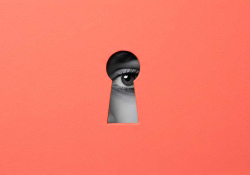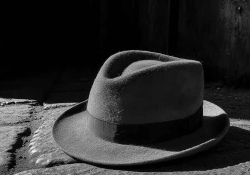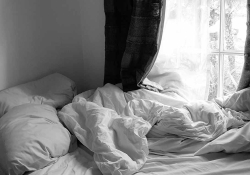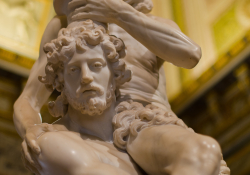Daseyn: A Theater of the Mind

In this fictive dialogue of Johanna Schopenhauer with her son, Arthur, family appears as a philosophical playing field: mother-root and son’s wants. Of dreams and desire, perception and self-assertion, life and luck, will and reality.
The Fear in You
A weapon in your room, are you mad, Arthur? You have to defend yourself? From whom I wonder? Nobody wishes you ill! Your continuous suspicion, what’s going on with you? That’s what I asked you then, do you remember, Arthur? You even chased the barber away, as if he wanted to cut your throat with his razor.
Your Warding Off the World Gives Birth To
Your grievances: the human world’s a hell, woebegone and in no way desirable. You couldn’t lament enough about the stupid world.
The agony of being holds me prisoner, you sobbed and threw yourself at my bosom.
Arthur, you’ve got a sharp eye for other souls in anguish, the abysses of the soul, for human misery. Have acquired the great insight of one’s self in others. Mentioned that’s the sole reason for empathy and unselfish behavior. And yet you can’t help yourself. Just see the devil in others’ souls. Life as continuous deception. How does that all comport, Arthur?
Contempt for Humans
You call yourself a despiser of humans? Savages devour one another, the tame deceive one another, you may be right about that. Still, my dear Arthur, why do you rage at yourself, flee from humans? I think you suffer from yourself, from the misery, the melancholy in you, inherited from your father. His pessimism pervades your every thought and behavior.
Hate and Aggressions
I heard about the incident with the seamstress. She’ll never be able to work again, that’s how violently you threw her on the floor, the poor thing. That’s the way it was with you, if someone came too near, prattling the way she did, really a lot, you could get utterly ugly. You, who can write so exquisitely about empathy.
Where was your creative look at the world then? Now you’ll have to pay her an income for the rest of your life. That’ll comfort you little. Is this sort of causality just appearance, as you call it? Will and chaos nothing but dreamt experience?
Self-Pity
If I wanted to give you hope, cheer you up, your disdain came back at me. My eternal optimism was a mockery of humankind’s nameless sorrows, an absurd, wicked way of thinking. You got on everyone’s nerves with your discontent.
Sorrow
Humans can make one another’s lives miserable, I agree with you.
But it’s our own sorrowful experience . . . your tyrannical father saw to it. The depressions, later his dementia, unbearable to the end. His suicide, bad enough; odd, later in life you began to glorify him.
Women’s Lot
Our marriage wasn’t happy, for neither of us. A marriage-of-convenience, I was eighteen, he thirty-seven; my parents were for it. I had to renounce love, like Gabriele. She’s not only an invented novel character. Many of my women readers had to go through similar things. Only via motherhood was their happiness guaranteed, which is what all the men wanted. What a burden for us women.
Indeed, I was delighted when I held you in my arms, watched you play, happy, laughing, but how quickly that changed.
No, Gabriele wasn’t meant to be a novel of renunciation, rather a bildungsroman. For the first time the development of a woman’s core, her striving and maturing into an independent personality. Sadly, even my dear Goethe didn’t realize that, although he praised my work.
To be sure, we owe your father a luxurious life. Our beautiful house in town, the large country house with a pond and park, chaises, social gatherings. We traveled around Europe. For me that was liberation, breathing in expanses. You were often allowed along, above all to England and Scotland. Adele was still too young, she remained in the care of the nanny. The wild beauty of Scotland, England so lovely, what a contrast to the industries there, the factories, the mines; the workers and their families, unimaginable how these poor people have to live. I took a lot of notes, a collection for my travel commentaries later; you know they were ripped from my hands. I also won’t forget that in contrast to my parents your father allowed me costly painting lessons.
Children’s Lot
They had given me up to a convent-school. I was to learn how to sit still – at three years! Compulsion educates no children, just makes them unhappy. You’ve had to learn that too. You didn’t want to become a merchant like your father, wanted instead to attend an academic high school. How long you begged him to do so! He forced you into an office. The apprenticeship was painful for you. But you were smart, learned quickly, that pleased your father. He even treated you to a year of travel around Europe, you were supposed to become a wide-ranging merchant, fluent in languages. After the travel you fell into a deep hole, your merchant’s lot seem sealed. Until the death of your father opened the way to the gymnasium. Arthur, sometimes I think you wished him dead. Is it this secret feeling of guilt that bore on you, which you hatefully attached to me?
Encouragements
I’ve furthered you, encouraged you in your studies; apparently you’ve forgotten that. You wanted to go off alone to Hamburg as a boarding-school student. I let you make the move. You made up for lost ground there happily, sucked up stuff, buttoned up important intellectual contacts, met Philosophy for the very first time!
On Your Search for the Easiness of Love
And you fell in love, how could you not, with a woman out of reach: the adored opera singer, actress, Karoline Jagemann, the beautiful beloved of the duke. What would she want with a lad like you? There were rumors, you dedicated a love poem to her, which likely remained your only one.
Disappointment in Matters in Love
When did that change? What precipitated it? Disdainfully, you called us women broads in an essay. I read that with great displeasure: The female sex really and truly has no real sense or predisposition for music or poetry or the plastic arts; it’s merely apishness when they affect and pretend them.
Well, with my writerly pursuits I was even able to settle my friend Fernow’s debts after his death, have his children educated. I had much to thank this friend for. It was he who furthered my writings in the end. Don’t forget, Adele and I could then live very well for years. I, a woman, was acknowledged, my works were sold.
Publishers scrambled after me. They also made good money off me.
But for you broads are just subordinated creatures, a middle stage between child and man. Only the man’s the only human being, ergo, Arthur, are women therefore not human beings for you?
Often Leads to Madness
Caroline Medon, opera singer, dancer, director. She loved you. You moved in together, but you didn’t want to marry. Separation and reunion. When you demanded she move to Berlin with you without your young son Carl, she refused. Bravo! No surprise that your relationship ruptured over that. Carl Medon, my only grandchild. I’ve heard he’s an artist; like his mother, a dancer. Then you wanted with your 43 years to take the 17-year-old Flora as your wife! Fortunately, her parents were also opposed. Arthur, you despise women, want to meet me on that basis, your mother, Johanna Schopenhauer?
Oedipus, your model, has much preoccupied you. Son of Jocasta and the accursed Laius. An abandoned son in search of his origins. Like you, many questions worried him, drove him on. Fearless, ignorant, he cast even the warning of the Oracle of Delphi to the winds. Fate and destiny: Jocasta and Oedipus. I’ve often thought about that because of you.
You didn’t want to hear about my successes. I was curiously well-known was all you knew to say. Art, you wrote, delivers from suffering, but is nothing but passing soothing. You were likely vexed in Berlin, when your thesis advisor introduced you to his colleagues: this is the son of Johanna Schopenhauer, Germany’s most prominent author.
You’re Building Walls of Loneliness around Yourself
Later you became a docent in philosophy at its very university. Yet scarcely a student lost his way into your lectures; all preferred going to Hegel. How you reviled him. It was envy that led your tongue. Charlatan, intellectual Taliban you called him, his work nothing but madhouse chatter. You couldn’t win any friends like that.
Earlier you hated your father, later become more and more like him. No one could suffer you – except your poodles. If one died, he was replaced by another, that’s what I was told; named them all Atman, Atem, the breath of life. You got along very well with Brahmanism. Every dog embodies every other dog, you wrote. Were you thinking of Goethe, of des Pudels Kern?
Arthur, I say to you quite candidly: You’re not a bad person, not without a mind and education, but nonetheless you’re overbearing and unbearable. All your good qualities are darkened by your super cleverness. How unfortunate for you!
The Time in Weimar
I was naïve about the signs of the political world back then, otherwise I’d never have moved to Weimar with Adele in that turbulent time. We’d been there scarcely four days when the war broke out. Napoleon’s troops invaded Saxony with blood, death and ashes. The thundering noise and whistling of the howitzers, cannon, salvos over our house. As if by a miracle it remained undamaged. Corpses, the dying and wounded in the streets. I helped as much I could in this misery. My tablecloths were used as bandages, my salon became a hospice.
How quickly war’s suffering is forgotten. Whatever was destroyed had to be quickly rebuilt. People wanted gaiety, social life. So it came in the nick of time that our nice house was still intact. I was able to be a hostess to Weimar’s society.
My large salon, Goethe a frequent guest. You showed him your first work. Today it pains me, dear Arthur – I hadn’t honored it then, but he, the great master! He was enthusiastic. Brockhaus the publisher as well; but you soon repulsed him with your domineering manner.
The Theory of Colors
Your essay “On Seeing and Colors” I sent to Goethe. The beginning of a correspondence. He was the only one whose company you sought. In order to be close to him, you engaged with his theory of colors. No one besides you recognized its epoch-making value. Your assessment was different, and yet, you inspired each other. Do you recall Goethe’s sentence: . . . so that the sun finally shone into the old rats’ and owls’ nest? He devoted twenty years of his life to his theory of colors. Oh, Goethe . . .
The Salon and Goethe
What fun it was then, the tumult among the ladies, my invitation to tea, I wrote you about it. Goethe had married his old, beloved Vulpius on Sunday. I thought, if Goethe gives her his name we can certainly give her a cup of tea. At first the ladies could scarcely conceal their condemnation, yet because Goethe had married her now it was no more than right and just to present her to society.
Do you remember that Charlotte von Schiller called her a podgy nothing, Bettina von Arnim spoke of her as nothing but “blood sausage, who’s gone mad”? Naturally Goethe broke off contact with her after that. I could clearly see how my behavior toward her pleased him. He had confidence in me, and I certainly wanted to earn it. He’s never forgotten my good offices. He’s become an ersatz father to you both. You know Adele called him father her whole life. She was very close to the Goethe family. You’ve even referred to yourself as his dear son.
It was a wonderful time. My salon enriched Weimar. Painters, philosophers, writers, the most prominent of that time were our guests. In spite of your shyness you joined us gladly when you stayed in Weimar.
Our Breakup
Your studies in Berlin, your dissertation with that horrible title. You returned, wanted to live with me and Adele. Georg Friedrich, my dear friend about the house, was living with us in the meantime.
I approved it, my biggest mistake! You didn’t hold up your end in the arrangement of our living together. You didn’t like Friedrich, reproached me, implying he was considerably younger than I. How was that your business? You understood nothing. He was different from other men whom I knew. A man who respected women, who loved, fostered. You didn’t want to see that I was happy with him. Played the ersatz patriarch. Those vile arguments, hatched by you, your constant taunts, your growing hatred. He or I, that was your demand. You, a grown son, wanted to get the better of your mother.
Dishes flew, words flew, doors. It couldn’t go on like that.
I wrote you a goodbye-letter: Your distrust, your rebuking my life, your contempt for my sex, this and much more . . . undoes us. I’ll have nothing more to do with you. Live and be as happy as you can. That was 1814. We never saw each other afterward.
Your Method of Revenge
Five years later, your shabby behavior when our bank in Danzig went bankrupt. You’d long withdrawn your inheritance by a third, but Adele’s and my assets were still there. They offered us an arrangement that helped Adele and me, would have only meant a smaller loss for you. Yet you refused the offer, knowing well what that meant for us. We lost almost everything.
And Its Consequences
In the beginning I could compensate for the losses by my literary pursuits, had always made good money from my books. But later, when the strength of my writings suffered from my illness, no press, no newspaper accepted my works anymore. We were poor, although outwardly it might have looked otherwise. Adele called it sham prosperity.
Adele
She’s a talented writer, but alas she can’t earn any money with her poems, fairy tales and novels, not with the art of paper cutting either, which she’s a master at. With her friend Sibylle she’s happily reunited after years of separation. Had Adele written you about that sad time? Told you of her worries, her jealousy of Laurina Spinola, Sibylle’s Italian lover, her great love. Only after she died did Sibylle return. That was 1826. There’s no love without pain, which is how Adele’s poem to Sibylle ends: “Deep inside, where pains bestir, the heart’s torments awhirl.” Adele never wanted a husband, no surprise given her father. Sibylle’s a strong woman, a passionate archaeologist, you should see her antique coin collection. In addition to being beautiful and smart, she’s the star of literary circles, a fantastic self-sufficient woman, fortunately with enough means to afford being independent. Both of them see after me touchingly. In the worst of times I could live with them. But I also need my independence, wanted to live by my own wits and moved away. A small honorary pension helped me with the most necessary things to stay alive.
Adele was always torn up by our unsettling relationship. She didn’t want to hurt either of us. Naturally I suspected she’s in touch with you, her older brother. When she wrote you in despair about our poverty, you offered your support. I rejected it . . . We two, you and I, are two characters with a strong will. The will, our main theme, in very different ways. We have to pay a price for that.
Dance to Death
The new year. The year 1838’s scarcely begun, it’s March already. It’s cold in the flat, that makes me lifeless, like my illness and my circling around you. The breach between us I’ve never been able to overcome. Why was our life determined by our struggling, our awful altercations? Had I cared about myself too much, didn’t feed you enough love and praise? For a long time, I thought your impossible behavior wouldn’t allow for a reunion. Today I can also see my own behavior in a different light.
When Goethe made me aware of your talent, this sentence tumbled out, which I deeply regret today: I’ve never heard of two geniuses in one family, and meant myself. That must have struck you! It seems they do exist, two geniuses in one family. Even if you’ve not yet experienced much recognition, so I think it’s likely that later they’ll talk about you as the great philosopher, about me only as the mother of Arthur Schopenhauer.
Arthur, it won’t be much longer, and I’ll dance into death’s arms. Didn’t you write in your last book: A person’s course of life consists in his dancing into death’s arms fooled by hope? Yes, Arthur, everyone sails into the harbor shipwrecked and without masts at last.
Muse and esprit have fled. Soon my life, my breath will give way, my eyelid no longer fall in my stiffening body to cover my refracting eye, my chin heal up. All that’s left a pale, heavy body in the sweat of death. My face peaceful or a final struggle, perhaps a smile.
I remain in you – ineradicable like every mother’s-root. It will nourish you, it will disturb you. Love, which separates and unites.
Arthur, beloved son: Live and be as happy as you can.
Translation from the German
Johanna Schopenhauer; born 1766 in Danzig, died 1838 in Jena
Arthur Schopenhauer; born 1788 in Danzig, died 1868 in Frankfurt
Adele Schopenhauer; born 1797 in Hamburg, died 1849 in Bonn
Sibylle Mertens-Schaaffhausen; born 1797 in Cologne, died 1857 in Rome
















